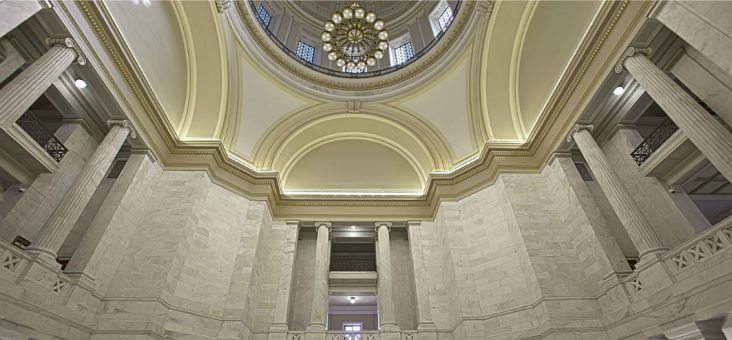House committee advances voter ID amendment
by February 22, 2017 8:49 pm 217 views

A proposed constitutional amendment that would require Arkansas voters to present a photo ID was advanced by a House committee Wednesday. Meanwhile, another proposal that would change the way constitutional amendments are enacted has gained support to be a third one presented to the voters, a co-sponsor said.
Under House Joint Resolution 1016 by Rep. Robin Lundstrum, R-Elm Springs, voters would be required to present a photo identification at their polling place or when voting absentee. The Legislature would establish by law the types of photo identification that would qualify. The state would be required to issue photo IDs for free to voters who do not have one. Voters without an ID would be able to cast a provisional ballot.
The House State Agencies and Governmental Affairs Committee advanced the amendment, which now moves to the full House for consideration.
Legislators are allowed to refer three amendments to the voters, but rules adopted this year allow each chamber to refer one amendment, with a third amendment possible with a two-thirds vote by the House and Senate.
The voter ID resolution was one of four advanced for further consideration by a subcommittee the previous day. At the beginning of the meeting, the committee’s chairman, Rep. Bob Ballinger, R-Hindsville, announced that the fourth resolution would not be considered because it was being amended, but he said he believed it had enough support in the Senate that it could become the third proposal presented to the voters.
That proposal, House Joint Resolution 3 by Speaker Jeremy Gillam, R-Judsonia, includes many provisions changing the process for amending the Constitution, and making it harder to do so. It would require legislatively referred amendments to have the support of a two-thirds vote of both the House and the Senate instead of the current simple majority vote in both chambers. All amendments would require a three-fifths majority of voters, rather than the current simple majority. Constitutional amendments could not bestow privileges on specific individuals and business entities, as has been attempted in several recent voter-initiated amendments. Ballinger is a co-sponsor.
The committee did not advance two proposals. House Joint Resolution 1011 by Rep. Trevor Drown, R-Dover, would give the Legislature the authority to enact legislation impacting higher education institutions, including regarding tuition and fees, and would allow the Legislature to exercise oversight over those institutions’ operations and finances. House Joint Resolution 1008 by Rep. Jim Dotson, R-Bentonville, would give the Legislature authority over the State Highway Commission, which currently is constitutionally autonomous.
The committee later will consider the Senate’s chosen amendment, Senate Joint Resolution 8 by Sen. Missy Irvin, R-Mountain View, which would limit jury awards in civil lawsuits and limit lawyers’ contingency fees to one-third of a judgment.
In presenting her resolution, Lundstrum argued, “Having the right to vote and knowing that vote counts is paramount to everything that we do, and we need to offer that security.”
The Legislature in 2013 passed Act 595, which also required voters to present a photo I.D. at the polls, but it was struck down by the Arkansas Supreme Court.
The late Justice Donald Corbin wrote in his majority opinion that the measure added a qualification to voters that is not included in the Constitution. Justices Courtney Goodson, Karen Baker and Jo Hart, all of whom are still on the seven-member court, offered a concurring opinion based on the fact that the act was not passed with a two-thirds majority. They said that amount was required because the law changed a constitutional amendment, Amendment 51, which governs the registration of voters. They did not rule on the qualification issue.
On Feb. 16, the Senate approved House Bill 1047 by Rep. Mark Lowery, R-Maumelle, that would require voters to present a photo ID. Lowery has said he is attempting to pass the bill with at least a two-thirds majority.
However, if it passes, it would be a statute that also could be ruled unconstitutional, unlike Lundstrum’s resolution, which would be enshrined in the Constitution. Ballinger, an attorney, said a lower court likely would rule Lowery’s bill unconstitutional because of court precedent, though the Arkansas Supreme Court could overturn that decision.
Gov. Asa Hutchinson said Wednesday that he would sign Lowery’s bill, calling it a “reasonable piece of legislation that can be reviewed by the court” as being sufficiently different from Act 595 of 2013.
Opponents of the voter ID amendment included Rep. Warwick Sabin, D-Little Rock, who argued that the amendment was unnecessary because voter impersonation is rare and there are other ways to commit voter fraud. Meanwhile, he said the amendment’s practical effect would be to disenfranchise some voters. About 1,200 ballots were not counted in 2014 before the law was struck down. Dotson argued that Lowery’s voter ID bill should be given a chance to work.
However, one of the committee members, Rep. Charlotte Douglas, R-Alma, said that an impersonator takes a voter’s right away from them.
“I think it’s time to put this to rest,” she said. “We show an ID for everything. What is the resistance to showing an ID to vote? Who are we protecting by not showing an ID?”
